Running a business is tough, but AI tools for SMBs are here to make your life easier. From automating tedious tasks to making smarter decisions, AI offers a wide range of benefits that can give you a competitive edge. The good news is you don’t need a Ph.D. in computer science to get started. This article will walk you through the top AI tools designed specifically for businesses, explaining their features in plain English so you can find the perfect fit for your needs.
Content creation
Write Faster, Smarter, and Funnier: AI Tools for SMBs
With AI-powered content creation tools, you can say goodbye to writer’s block and hello to a wellspring of ideas. These tools can help you brainstorm topics, generate outlines, draft social media posts that actually get likes, write entire articles in a fraction of the time, and even optimize your content for search engines. It’s like having a co-writer who never complains about deadlines or steals your snacks (and who’s available 24/7!).
Copy.ai: This budget-friendly AI software for small businesses is perfect for crafting marketing copy that converts, whether it’s attention-grabbing headlines, persuasive product descriptions, or engaging social media posts.
Grammarly Business: While not strictly an AI content creation tool, Grammarly Business goes beyond basic grammar and spelling checks, offering style suggestions and tone adjustments to help you perfect your writing. Its collaboration features make it ideal for small teams working together on content.
INK: This all-in-one platform combines AI writing assistance with SEO optimization tools, helping you create content that’s both well-written and discoverable by search engines. This is a great option for SMBs looking to improve their online visibility.
If you’re curious to learn more about the specific tools and how to use them effectively, check out our in-depth guide: “AI Writing Tools for Success: Create Better Content.” It covers everything you need to know to get started with AI-powered content creation.
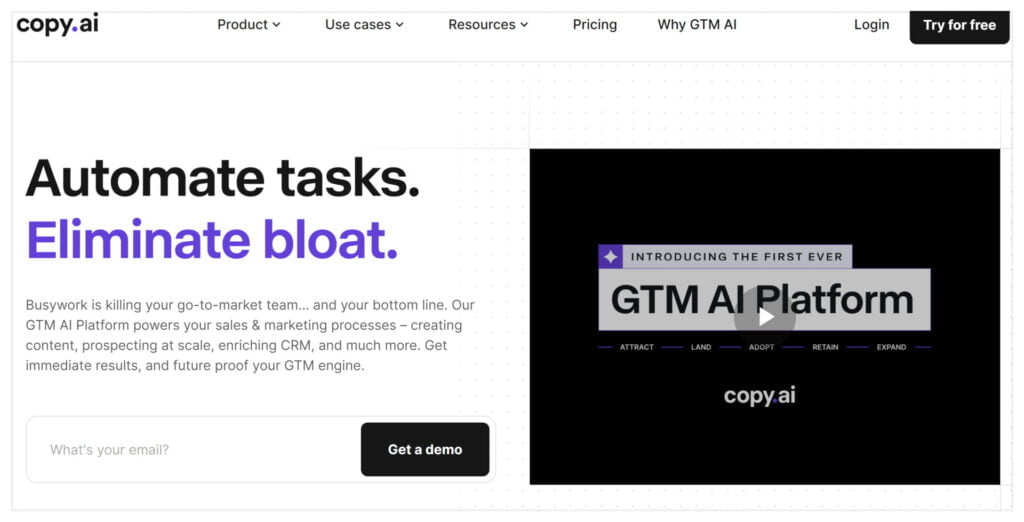
Photo credit: copi.ai
Customer service
Happier Customers, Happier You: AI-Powered Customer Support for Small Businesses
If you are tired of playing phone tag with frustrated customers, AI-powered chatbots are here to answer the call (literally). These digital assistants can handle a wide range of customer inquiries 24/7, freeing up your team to tackle more complex issues. They can answer FAQs, provide troubleshooting tips with the patience of a saint, and even process simple transactions like returns or exchanges without breaking a sweat. Plus, they never call in sick or demand a raise!
Tidio: This budget-friendly chatbot platform is a great starting point for small businesses exploring chatbots. Its chatbot seamlessly integrates with live chat, allowing for a smooth transition between AI and human support.
ManyChat: This platform is designed for building chatbots on social media platforms like Facebook Messenger and Instagram, which can be a great way for SMBs to engage with customers where they already spend their time.
Help Scout: This platform focuses on creating a knowledge base and self-service resources for customers. Its chatbot, Beacon, can proactively offer help to customers browsing your website or knowledge base, guiding them to relevant articles and resources.
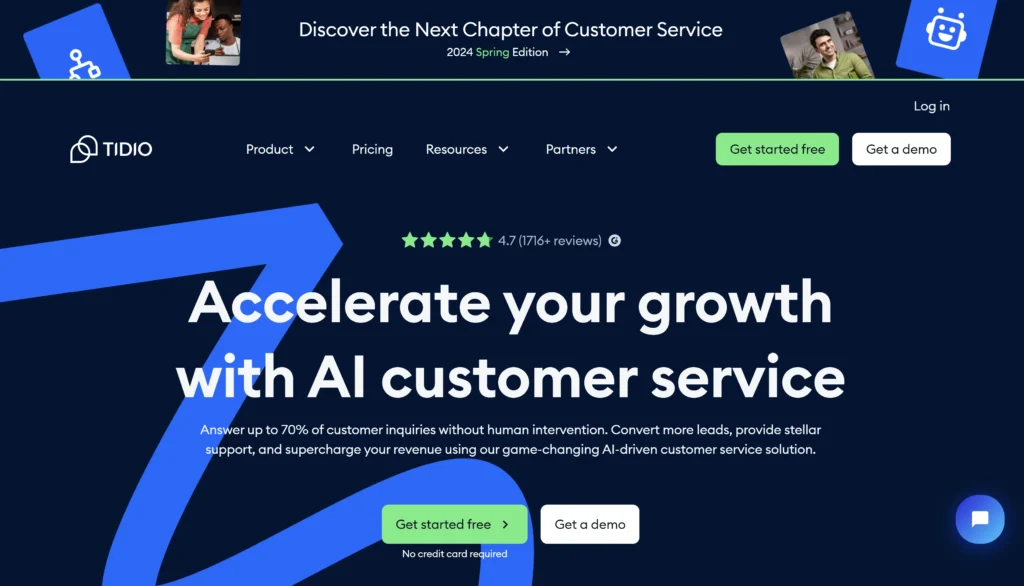
Photo credit: tidio.com
Sales and marketing
Supercharge Your Sales Funnel: AI Marketing Tools for Small Business Growth
Sales and marketing can feel like a high-stakes game of cat and mouse, but AI is your secret weapon for catching those elusive leads. These tools can automate repetitive tasks (like sending follow-up emails – so you don’t have to!), personalize marketing campaigns to make each customer feel like a VIP, and even predict which leads will most likely convert. It’s like having a team of marketing experts working tirelessly behind the scenes, all while you take the credit (we won’t tell!).
Brevo (formerly Sendinblue): This platform combines email marketing, marketing automation, and CRM features into one affordable package, making it a great option for SMBs that want to streamline their sales and marketing efforts.
ActiveCampaign: This powerful email marketing and automation platform can help SMBs nurture leads and drive conversions with personalized campaigns, even if you don’t have a huge marketing budget.
HubSpot Marketing Hub: While HubSpot offers a full suite of tools, its Marketing Hub is particularly well-suited for SMBs. It offers features like lead capture forms, email marketing automation, and landing page builders, all designed to help you attract and convert more customers.
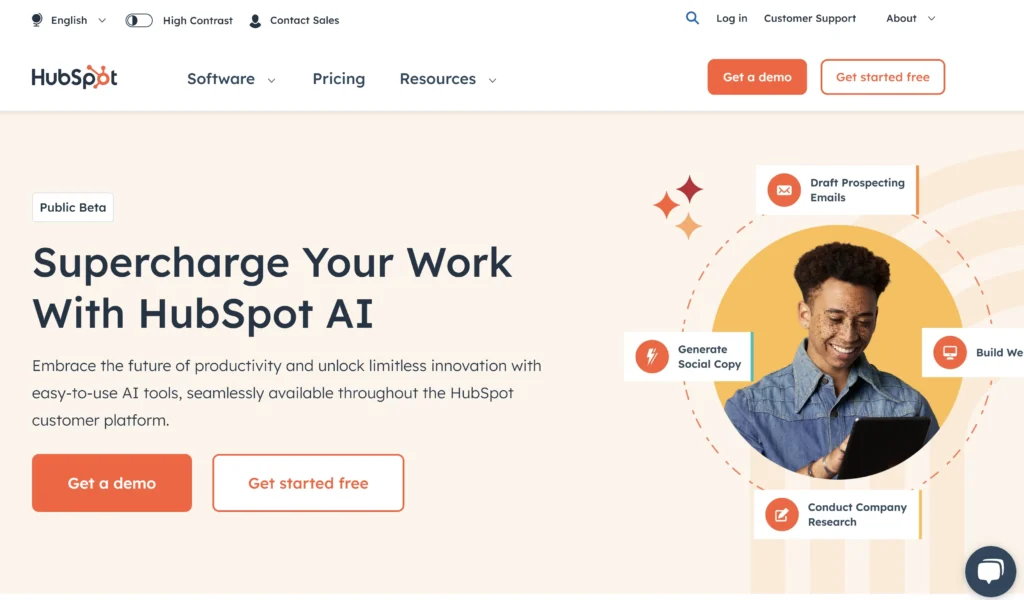
Photo credit: hubspot.com
Data analysis
Your Data, Your Way: User-Friendly AI Analytics for Small Businesses
Data analysis doesn’t have to be a daunting task reserved for tech wizards. AI tools can quickly sift through mountains of data, uncovering hidden trends and insights that can help you make smarter decisions without needing a Ph.D. in statistics.
Obviously AI: This platform simplifies data analysis for non-technical users, allowing you to ask questions about your data in plain English and get instant answers. It’s like having a data analyst in your pocket, ready to help you make data-driven decisions.
Google Data Studio: This free tool from Google allows you to create custom dashboards and reports to visualize your data in a way that’s easy to understand and share with your team.
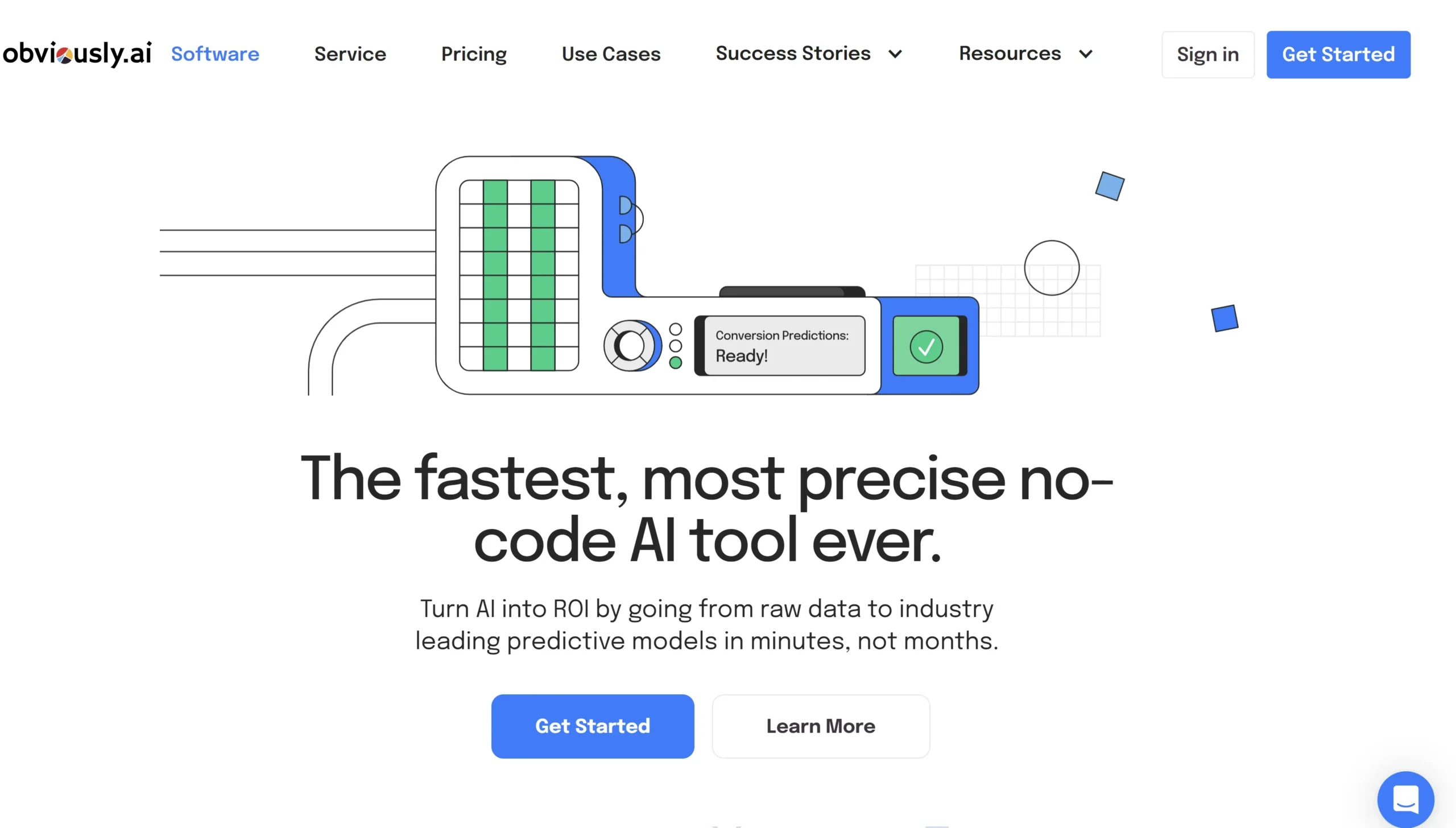
Photo credit: obviously.ai
Finance
Your AI-Powered Accounting Assistant (Coffee Runs Not Included)
Balancing the books can be a real headache, but AI is the aspirin you’ve been waiting for. These tools can automate those tedious financial tasks that make you want to pull your hair out (like chasing down invoices or reconciling accounts). Plus, they can analyze your financial data to uncover hidden insights and help you make smarter decisions (so you can finally take that much-needed vacation).
QuickBooks Online: This popular cloud-based accounting software offers AI-powered features like automated bank reconciliation, expense tracking, and even sales tax calculation. It’s a user-friendly and affordable option for small businesses looking to simplify their bookkeeping.
Xero: Similar to QuickBooks, Xero is a cloud-based accounting software that leverages AI for tasks like bank reconciliation, invoice automation, and expense management. Its intuitive interface and integrations with various third-party apps make it a favorite among small businesses.
FreshBooks: This invoicing and accounting software is designed with freelancers and small businesses in mind. It uses AI to automate invoicing, track expenses, and manage projects, helping you stay organized and get paid faster.
Fyle: Tired of chasing down expense reports? Fyle automates expense management with AI-powered features like receipt scanning, expense categorization, and policy enforcement. It integrates with popular accounting software, making it easy to keep your books up-to-date.
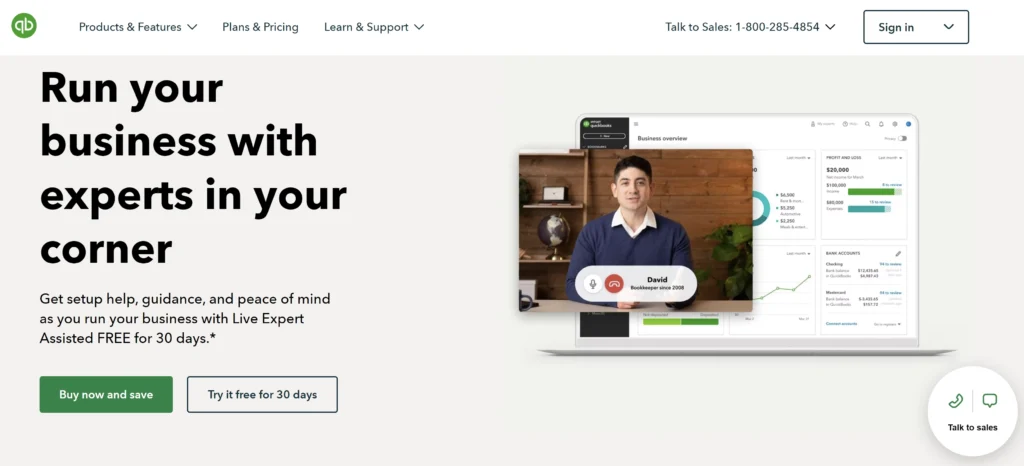
Photo credit: quickbooks.intuit.com
Inventory management
Keep Your Stock in Check (and Your Sanity Intact)
Managing inventory can be a juggling act, but AI is here to lend a helping hand (or a robotic arm, if you prefer). These tools can track inventory levels in real-time, automate reordering, and even predict future demand, ensuring you have just the right amount of stock on hand (no more overflowing warehouses or panicked last-minute orders).
Zoho Inventory: This cloud-based inventory management software is a great option for small businesses. It offers features like inventory tracking, order management, and reporting, all in an easy-to-use interface.
Cin7: This platform is designed for e-commerce businesses and retailers, helping them manage inventory across multiple channels and warehouses. It uses AI to optimize inventory levels and automate order fulfillment.
Dear Inventory: This software combines inventory management with manufacturing and accounting features, making it a good choice for small manufacturers who want to streamline their operations.
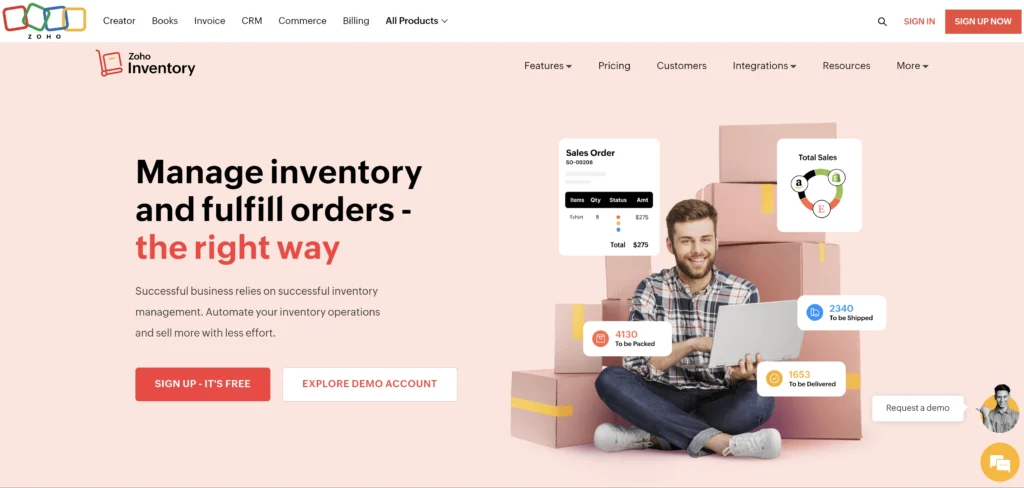
Photo credit: zoho.com
Human resources
Your Virtual HR Assistant (No Office Gossip, We Promise)
Recruitment, onboarding, training, and managing employee performance can be a time-consuming process. AI-powered HR tools can automate many of these tasks, freeing up your HR team to focus on strategic initiatives and building a positive company culture.
Recruitee: This applicant tracking system (ATS) uses AI to automate resume screening, candidate matching, and interview scheduling. It’s a great way to save time and resources during the hiring process.
Leena AI: This conversational AI platform can handle employee inquiries, automate onboarding tasks, and even provide personalized learning recommendations. It’s like having a virtual HR assistant available 24/7.
Hibob: This HR platform uses AI to analyze employee data and provide insights into engagement, performance, and retention. It can help you identify areas for improvement and create a more positive workplace experience.
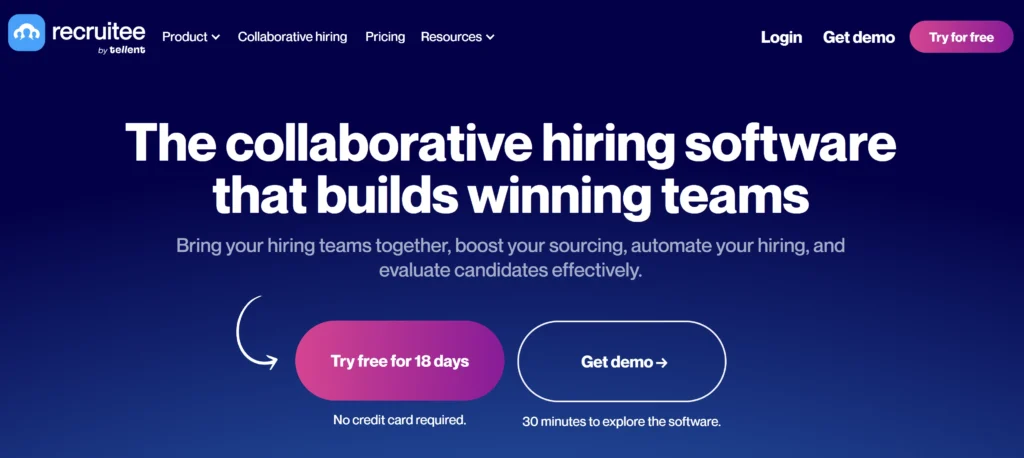
Photo credit: recruitee.com
Cybersecurity
Protect Your Business from Cyber Threats (No Hacker Lingo Required)
Cybersecurity is a top concern for businesses of all sizes, but small businesses are particularly vulnerable. AI-powered cybersecurity tools can help you detect and prevent threats before they cause damage without the need for a dedicated IT security team.
Malwarebytes: This popular antivirus software uses AI to detect and remove malware, ransomware, and other cyber threats. It’s a good option for small businesses that need basic protection.
Sophos Intercept X: This endpoint protection platform uses AI to detect and block advanced threats like zero-day attacks. It also includes features like anti-ransomware and exploit prevention.
Webroot: This lightweight, cloud-based endpoint protection solution leverages AI to defend your devices from viruses, malware, ransomware, and phishing attacks without slowing them down. Its easy-to-use interface and affordable pricing make it a popular choice for small businesses with limited IT resources.
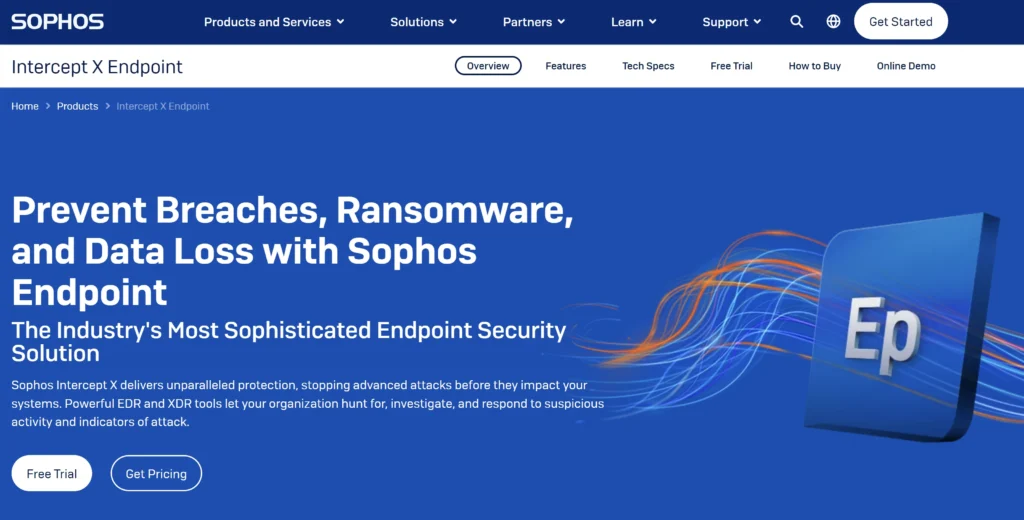
Photo credit: sophos.com
The beauty of these AI tools lies in their accessibility and user-friendliness. You don’t need to be a tech expert to leverage their power. By embracing these technologies, you’ll not only save time and resources but also gain valuable insights, improve decision-making, and ultimately propel your small business toward greater success.
Don’t be intimidated by the jargon or the perceived complexity of AI. Start small, experiment with different tools, and find the ones that best suit your specific needs and budget. With the right AI tools in your arsenal, you’ll be well-equipped to navigate the challenges of running a small business and unlock its full potential.
For those who rely heavily on Excel, we’ve also put together a comprehensive guide on the best AI tools for Excel to streamline your workflows and uncover valuable insights.
The future of small business is here, and it’s powered by AI. Embrace it, and watch your business thrive.
FAQs
What are the best AI tools for small businesses?
The best AI tools for small businesses depend on your specific needs and budget. Popular options include:
- Content Creation: Copy.ai, Grammarly Business, INK
- Customer Service: Tidio, ManyChat, Help Scout
- Sales & Marketing: Brevo, ActiveCampaign, HubSpot Marketing Hub
- Data Analysis: Obviously AI, Google Data Studio
- Finance: QuickBooks Online, Xero, FreshBooks, Fyle
- Inventory Management: Zoho Inventory, Cin7, Dear Inventory
- HR: Recruitee, Leena AI, Hibob
- Cybersecurity: Malwarebytes, Sophos Intercept X, Webroot
What are the benefits of using AI tools for my business?
AI tools offer numerous benefits for businesses, including:
- Increased Efficiency: Automate repetitive tasks, freeing up your team for higher-value work.
- Improved Decision-Making: Gain valuable insights from data analysis and predictive modeling.
- Enhanced Customer Experience: Provide 24/7 support and personalized interactions through chatbots.
- Streamlined Marketing: Target your audience more effectively and create compelling content with AI-powered tools.
- Cost Savings: Reduce operational costs through automation and optimization.
- Competitive Advantage: Stay ahead of the curve by adopting innovative technologies.
Overall, AI can revolutionize your business by making it more efficient, customer-centric, and profitable
Do I need technical expertise to use AI tools?
No, you don’t need technical expertise to use many AI tools. Many platforms are designed with user-friendly interfaces and require no coding knowledge. Some even offer tutorials and support to help you get started.
However, some more advanced AI tools might require some technical understanding. However, the majority of AI tools aimed at small businesses prioritize ease of use, making them accessible to everyone.
Which AI writing tools are best for creating marketing copy?
Several AI writing tools excel at crafting marketing copy, each with its strengths:
- Copy.ai: Budget-friendly and versatile, ideal for various marketing materials.
- Jasper: Powerful for long-form content like blog posts and articles, with strong SEO features.
- Writesonic: Specializes in landing page copy and social media content.
- Anyword: Focuses on data-driven copywriting, predicting performance, and suggesting improvements.
The best tool for you depends on your specific needs and budget. Try out free trials to see which suits your style and goals.
What are the best chatbot platforms for small businesses?
The best chatbot platforms for small businesses are often affordable, easy to use, and offer features tailored to their needs. Popular options include:
- Tidio: Budget-friendly, integrates with live chat for seamless support transitions.
- ManyChat: Ideal for social media engagement on platforms like Facebook and Instagram.
- SendPulse: Offers a free plan with basic features, ideal for testing the waters.
- Chatfuel: Intuitive interface for building simple chatbots without coding.
- MobileMonkey: Robust platform with omnichannel support and marketing automation features.
The best choice for you depends on your budget, preferred channels, and desired level of customization. Consider exploring free trials to find the platform that best suits your business.
How can AI help me generate more leads?
AI can supercharge your lead-generation efforts in several ways:
- Personalized outreach: Analyze customer data to craft highly targeted messages and campaigns.
- Lead scoring: Identify and prioritize the most promising leads based on their likelihood to convert.
- Chatbots: Engage website visitors 24/7, answer questions, and capture their information.
- Predictive analytics: Forecast which leads are most likely to convert and focus your efforts accordingly.
- Content optimization: Tailor your content to resonate with your target audience and improve search engine rankings.
By leveraging AI, you can automate tedious tasks, gain valuable insights, and nurture leads more effectively, ultimately boosting your sales pipeline.
Which AI analytics tools are user-friendly for non-technical users?
Several AI analytics tools cater to non-technical users, simplifying data analysis and offering valuable insights without requiring coding knowledge. These include:
- Obviously AI: Allows you to ask questions in plain English and receive instant answers from your data.
- Google Data Studio: Creates custom dashboards and reports for easy visualization and sharing.
- Microsoft Power BI: Offers intuitive drag-and-drop features for creating reports and dashboards.
- Tableau: Provides a visual interface for exploring and understanding data, even for beginners.
- Qlik Sense: Uses associative technology to help users discover hidden relationships in their data.
These tools prioritize user-friendliness, allowing even non-technical individuals to harness the power of AI for data-driven decision-making.
What are the best AI-powered accounting software options for small businesses?
The best AI-powered accounting software for small businesses often depends on your specific needs and budget. Popular options include:
- QuickBooks Online: Offers a user-friendly interface, automated bank reconciliation, expense tracking, and sales tax calculation.
- Xero: Provides intuitive features like bank reconciliation, invoice automation, and expense management, with integration to third-party apps.
- FreshBooks: Ideal for freelancers and small businesses, automating invoicing, expense tracking, and project management.
- Zoho Books: Combines accounting with inventory and project management features.
- Wave Accounting: A free option for basic accounting needs, with paid add-ons for payroll and invoicing.
Explore free trials and demos to determine which software best aligns with your business requirements.





